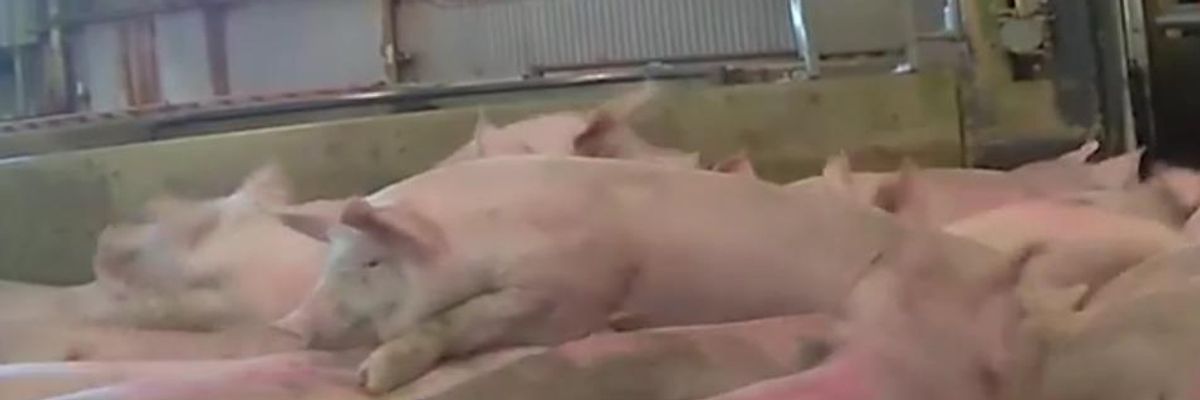Damning undercover video footage, combined with new affidavits from U.S. Department of Agriculture (USDA) whistleblowers, reveals disturbing food safety issues and animal abuse at Hormel's largest pork processing plant, one of five in the country to employ a controversial high-speed slaughter program.
The video footage, posted Wednesday in edited form on YouTube (warning: graphic content), was covertly filmed by a contracted employee of Compassion Over Killing, a nonprofit animal rights group that claims to have infiltrated an Austin, Minnesota, facility run by Quality Pork Processors (QPP). The plant is a supplier of Hormel Foods, the maker of Spam and other processed meats, and also distributes pork to retailers like McDonald's and Famous Dave's.
QPP is one of five pork plants participating in the USDA's high-speed hog inspection pilot program, under which processing line speeds move at a rate 20 percent faster than at conventional plants and about 1300 hogs are processed per hour.
The pilot program, known as the HACCP-Based Inspection Models Project (HIMP), was ostensibly established to allow processors like QPP to assume more responsibility over the inspection process. While HIMP has been in place for years, the USDA has not yet thoroughly reviewed the program to determine its effectiveness. That announcement is expected in early 2016.
As the Washington Post explains:
In the HIMP inspection model, three government inspectors are stationed on the production line, compared to the usual seven who oversee the handling of carcasses in the traditional system. In both, an additional offline inspector is free to move around. The reduction in government inspectors dedicated to checking hogs on the line has allowed the government to save money by reducing its inspection force. It has also allowed plants to increase their line speed -- on average, participants in the pilot program process roughly 120 extra hogs per hour, according to the USDA.
The affidavits, submitted to the Government Accountability Project's (GAP) Food Integrity Campaign, support the shocking footage which documents animals being beaten, shocked, dragged, and improperly stunned; pigs covered in feces or pus-filled abscesses being slaughtered and processed for human consumption; and a supervisor sleeping on the job.
"Personally, I will not eat any products that bear the name of the company for which this meat is produced--I don't think that it is wholesome or safe to consume," states the affidavit (pdf) from Joe Ferguson, a former USDA inspector, who further charged that the "new inspection model is an obvious example of the revolving door between the industry and the agency."
Another affidavit (pdf), from an anonymous food inspector who currently works at one of the five pilot-program plants, reads in part: "To remain in the HIMP program, pilot plants are supposed to exceed or at least meet the USDA's standards for food safety and quality. I can say without a doubt that this plant is not meeting, and is certainly not exceeding those standards. The only way this plant could possibly be meeting those standards is by manipulating plant employees, USDA inspectors, and their own records and processes. I have personally witnessed all three."
"Food safety has gone down the drain under HIMP," the affidavit states flatly.
A third anonymous whistleblower said (pdf) that on "numerous occasions" he witnessed employees "fail to spot abscesses, lesions, fecal matter, or other defects;" while yet another affidavit charged (pdf) that contamination often "ends up going undetected because animals are flying by so quickly."
GAP's Food Integrity Campaign and The Other 98% have launched an interactive website that takes people through the pork supply chain and illustrates the negative impact of Hormel's practices on the environment, animal welfare, public health, and worker safety.
"People who love their bacon and Spam should know what's really going on at the source," said Amanda Hitt, director of the Food Integrity Campaign. "Hopefully these whistleblowers' concerns will move the public to action."
